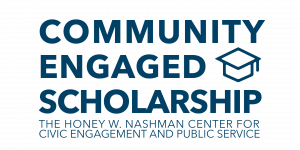
Abbie Weiner’s "Interpersonal Communication" class gives undergraduates in the Columbian School of Arts and Science an opportunity to get a taste of Community Engaged Scholarship through connecting the principles of interpersonal communication and service. At the beginning of the semester, the students were given an option of three different organizations: Free Minds, the YWCA, and the Latino Student Fund. Virtually, each student will volunteer 10 total hours at their specific site of choice.
Fall 2023
Professor: Abbie Weiner
Students Reporting: 17
Time Reported: 318.08 hours
Community Partners:
| CP | # of students reporting |
| DC Central Kitchen | 2 |
| Martha's Table | 1 |
| Miriam's Kitchen | 1 |
Student Comments:
“One of the highlights of my time at DC Central Kitchen was seeing the smiles on the faces of those we served. It's a simple yet powerful reminder of the positive impact we can make through our service and support.” - Student working with DC Central Kitchen
“It was a good experience with many nice people helping me and teaching me how to volunteer properly. We had different types of foods ranging from vegetables to frozen meats. The people that came in to grab food had points and could choose different types of foods. As a volunteer I helped them "shop" for the food and put the things in their baskets. It was not as busy as in the morning so I also helped the volunteers get ready for the next week.”- Student working with Martha’s Kitchen
“Aside from those small physics stresses, I also felt some emotional stress. It was difficult to see so many young mothers trying to support their families all alone. I also encountered many elderly people, as well as marginalized people with disabilities.
"At Martha’s Table, I practiced assertiveness and responsiveness. I had to assert myself through standing my ground about the number of items each person was to receive. By each basket of food, there is a card that details the maximum amount to be given. Some people try to bargain with you, but it is important to be assertive so that there will be enough for everyone. However, I also had to practice my responsiveness by considering the person’s position and respectfully and thoughtfully declining.I also noticed shyness and communication apprehension in some of the people I encountered. It was clear to me that some people had extreme difficulties communicating with me. One thing I noticed is a major lack of eye contact. Others felt shy speaking to me. It may have been my young age and the position I was in compared to them. I feel that I widened my perception by entering an environment that differed so greatly from the “bubbles” I have been inside for much of my life. I gained some perspective surrounding myself with all types of people, many of whom are in much less fortunate positions than I am.” -Student working with Martha’s Table
At Free Minds, the art of reading and creative writing is used to help incarcerated youth express themselves and heal. The student volunteer can attend Virtual Write Nights where they provide feedback to poetry written by Free Minds members or participate in Writing Circles where volunteers write letters to members. The YWCA works to improve the lives of women and girls of color by focusing on Health and Safety, Empowerment and Economic Advancement, and Racial Justice and Civil Rights. For students in Professor Weiner’s class, engagement with YWCA is a one-on-one mentorship program with young girls ranging from 11 to 17 years old. The final affiliate is the Latino Student Fund, an organization that addresses inequities in education for Hispanic students in DC by promoting higher education and professional leadership. The student volunteer for the LSF will be a tutor and mentor for a K-12 student once a week. Despite the virtual format of the service, engaging in community service in an academic environment, has the potential to widen the minds of undergraduate learners.
Before attending GW, and even during my freshman year, I was an “undecided” student with a lot of passion and interest and no specific direction to hone in on. As I continued on my exploration, I took two service-learning courses, “Intro to Human Services & Social Justice” and “Interpersonal Relationships.” As the first weeks of class went by, my fears subsided, and I finally felt like I was in the right place. Community Engaged Scholarship is the opportunity to learn while doing- to actively participate in the world around you and then reflect with classmates and professors. My discovery of Community Engaged Scholarship at GW is what gives me purpose, for the possibilities to learn and grow are endless.
If you are interested in taking a course with community engaged learning, visit the Honey W. Nashman Center Website.


